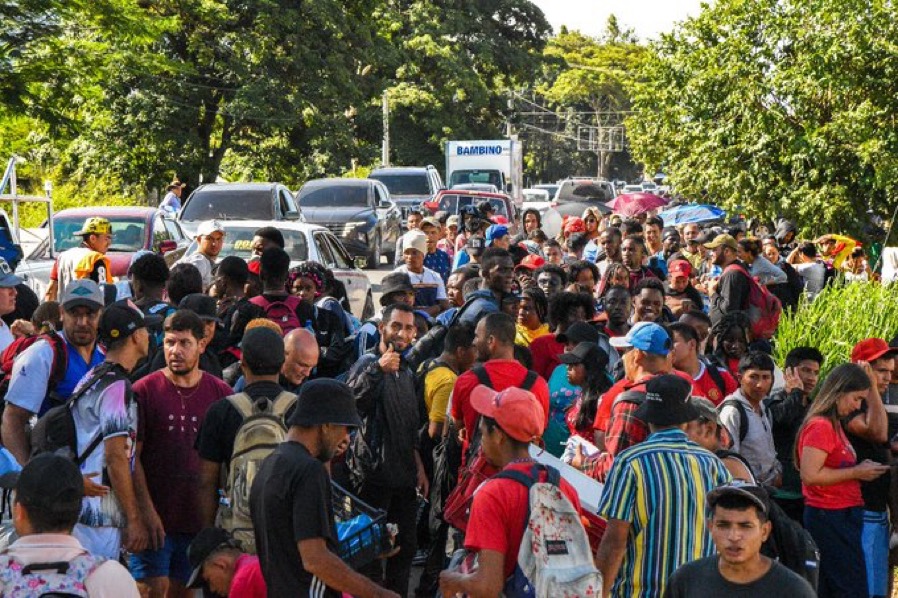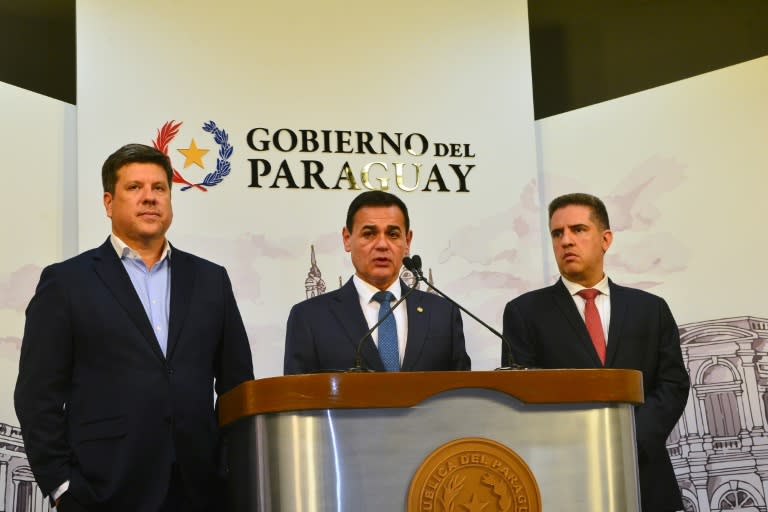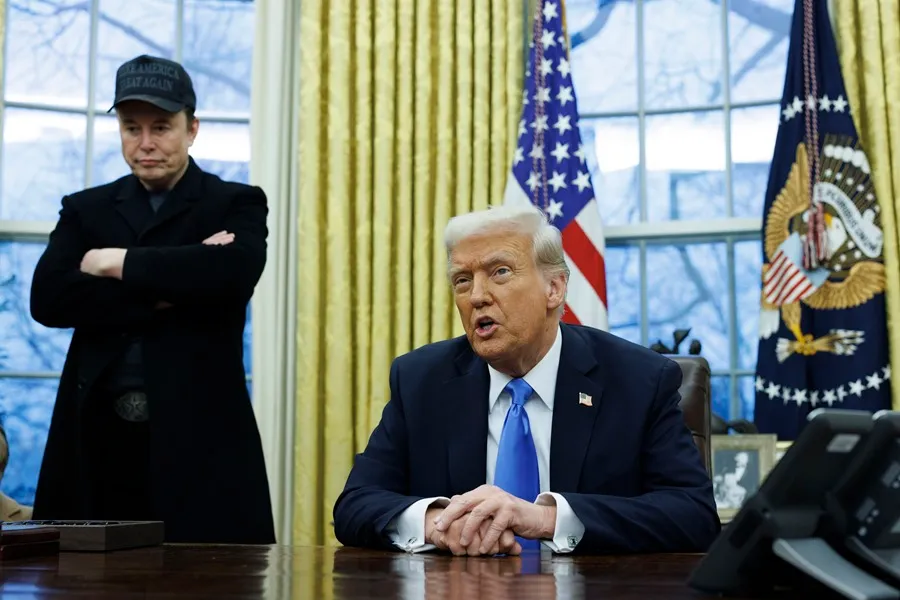International
Over 1,500 migrants face blockade by mexican authorities in Chiapas

A caravan of over 1,500 migrants that set out this week from Mexico’s southern border is facing a blockade by Mexican authorities, who are preventing them from leaving the state of Chiapas, which borders Central America.
Amid pressures from U.S. President-elect Donald Trump for Mexico to control the flow of migration, the group departed at 5:00 a.m. (11:00 GMT) from the municipality of Huixtla, moving slowly, with some migrants on bicycles and tricycles, flanked by the National Guard and municipal police.
The undocumented migrants, mostly from Venezuela, told EFE that officials from the National Institute of Migration (INM) have been monitoring their movements since their arrival in Huixtla, following them along the road. On Tuesday, the authorities attempted to detain a family, but the migrants prevented it.
The migrants are calling for understanding from Mexican President Claudia Sheinbaum, who last week assured Trump in a phone call that caravans “no longer reach” the U.S. border. Meanwhile, Trump has promised to impose a 25% tariff on Mexican products if the country fails to stop the “invasion” of migrants and drugs.
“President Sheinbaum should support us in reaching Mexico City, where there are more job opportunities, so we can wait for our ‘CBP One’ appointment (to apply for asylum in the U.S.) peacefully, because other states are more dangerous,” explained Venezuelan Genaro Cárdenas.
Cárdenas, who is traveling by bicycle with a group of fellow Venezuelans, remains hopeful of reaching their destination despite the obstacles and the pressure from immigration officials to convince them to return to the southern border.
“We fear that we will be disbanded and sent back to Tapachula, but we will continue forward,” Cárdenas warned.
International
Paraguay summons Brazilian ambassador over Itaipú espionage scandal

Paraguay summoned the Brazilian ambassador in Asunción on Tuesday to demand “explanations” and called its own representative in Brasília for consultations following Brazil’s acknowledgment of an espionage operation. The Brazilian government, led by President Luiz Inácio Lula da Silva, attributed the operation to the previous administration.
The surveillance effort aimed to uncover Paraguay’s position in now-suspended negotiations with Brazil regarding the pricing of electricity from the binational Itaipú hydroelectric plant, according to reports in the Brazilian press.
The Brazilian government “categorically denied any involvement in the intelligence operation,” stating in a Foreign Ministry communiqué on Monday that the espionage was carried out under former President Jair Bolsonaro’s administration (2019-2023).
“The operation was authorized by the previous government in June 2022 and was annulled by the interim director of the (state intelligence agency) ABIN on March 27, 2023, as soon as the current administration became aware of it,” Brazil’s government asserted.
Paraguay’s Foreign Minister Rubén Ramírez announced that Brazilian Ambassador José Antonio Marcondes de Carvalho was summoned “to provide detailed explanations” regarding the operation. Additionally, Paraguay recalled its diplomatic representative in Brasília “to report on aspects related to the intelligence activity conducted by Brazil regarding Paraguay’s government affairs.”
International
Elon Musk to step down as government advisor, per Trump insiders

President Donald Trump has informed his inner circle that Elon Musk will be stepping down from his role as a government advisor, according to a report by Politico today.
Citing three individuals close to Trump, Politico states that the president is pleased with Musk’s leadership at the Department of Government Efficiency (DOGE), where he has implemented significant budget cuts. However, both have agreed that it is time for Musk to return to his businesses and support Trump from a different position outside the government.
A senior administration official told Politico that Musk will likely maintain an informal advisory role and continue to be an occasional visitor to the White House. Another source warned that anyone thinking Musk will completely disappear from Trump’s circle is “deluding themselves.”
According to the sources, this transition is expected to coincide with the end of Musk’s tenure as a “special government employee,” a temporary status that exempts him from certain ethics and conflict-of-interest regulations. This 130-day period is set to expire in late May or early June.
International
Milei vows to make Argentina so strong that Falkland Islanders “choose” to join

Argentine President Javier Milei reaffirmed his country’s claim over the Falkland Islands (known as the Islas Malvinas in Argentina) and praised the role of the nation’s armed forces during a ceremony marking the “Veterans and Fallen Soldiers of the Malvinas War Day,” commemorating 43 years since the 1982 conflict with the United Kingdom.
Argentina continues to assert sovereignty over the islands, arguing that Britain unlawfully seized them in 1833.
“If sovereignty over the Malvinas is the issue, we have always made it clear that the most important vote is the one cast with one’s feet. We hope that one day, the Malvinas residents will choose to vote with their feet and join us,” Milei stated.
“That is why we aim to become a global power—so much so that they would prefer to be Argentine, making deterrence or persuasion unnecessary. This is why we have embarked on a path of liberation, working to make Argentina the freest country in the world and once again the nation with the highest GDP per capita on the planet,” he added.
-

 Central America3 days ago
Central America3 days agoU.S. Homeland Security Secretary urges Mexico to strengthen Guatemala border
-

 Central America3 days ago
Central America3 days agoPanama grants Martinelli 72-hour extension to travel to Nicaragua
-

 International1 day ago
International1 day agoParaguay summons Brazilian ambassador over Itaipú espionage scandal
-

 Central America4 days ago
Central America4 days agoPanama police clarifies that Interpol alert for Martinelli is still pending
-

 International3 days ago
International3 days agoTrump urges Putin to reach peace deal
-

 International4 days ago
International4 days agoDeportation flight lands in Venezuela; government denies criminal gang links
-

 Sports1 day ago
Sports1 day agoFilipe Luis debuts as coach in Copa Libertadores with Flamengo
-

 Central America1 day ago
Central America1 day agoGuatemalan police officer killed in mob riots over baby kidnapping
-

 International1 day ago
International1 day agoElon Musk to step down as government advisor, per Trump insiders
-

 Sports1 day ago
Sports1 day agoVenezuela investigates 18 baseball players seeking asylum in Spain
-

 International1 day ago
International1 day agoMilei vows to make Argentina so strong that Falkland Islanders “choose” to join
-

 International1 day ago
International1 day agoICE agent’s arrest of suspect sparks controversy in Boston
-

 International1 day ago
International1 day agoÓscar Arias: Trump’s trade policies are a step backward















